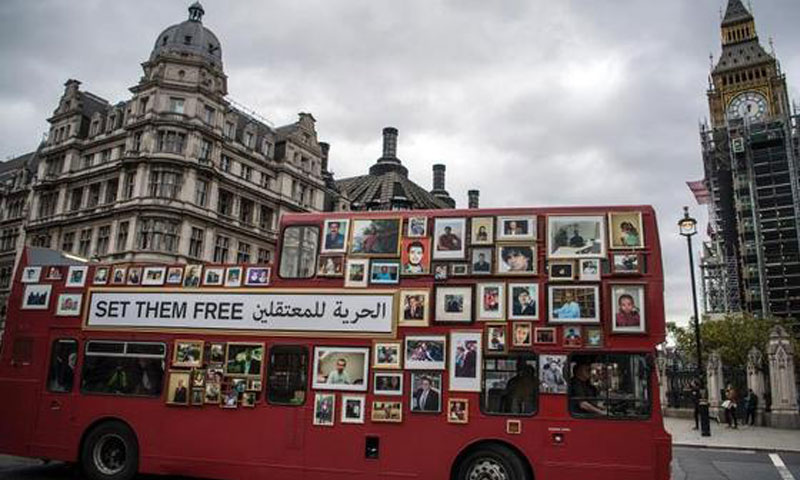From London, the red bus called ‘Damascus,’ carrying the photos of detainees and forcibly disappeared people in the Syrian prisons, within ‘Families for Freedom’ campaign launched by the families of detainees, started its Journey on Wednesday, October 11.
On the outside, the famous Londonian bus carried the photographs of dozens of Syrian detainees and a sign saying ‘Damascus’ and another saying ‘Freedom for Detainees.’ Six Syrian women, whose sons have been detained many years ago and became mere names in a forgotten file, boarded the bus.
The Syrian detainees’ cause has turned into a matter of controversy during international talks and conferences, which seek a political solution, amidst the demands of neutralizing the cause and keeping it away from any political settlement.
In the absence of official statistics, the Syrian Network for Human Rights documented the existence of 117,000 Syrian detainees and mentioned their names. However, the estimates show that the number is more than 215,000 detainees, 99 percent of whom are kept in the Syrian regime’s detention centers.
When the Bus became a Symbol
Bayan Sharbaji, whose two brothers had been detained by the Syrian regime in the city of Darayya six years ago, participated in the campaign. According to what she told Enab Baladi, the campaign seeks to introduce the British people, in particular, and the Europeans, in general, to the issue of forced disappearance in the regime’s prisons and the conditions of detention, which are far beyond the British imagination.
The campaign, she added, choose the bus because it has become a symbol in the mind of Syrian people: when the members of the Assad regime used it to imprison protestors in 2011 or when buses became linked to the forced displacement of civilians from their cities under ‘Cities Evacuation’ agreements adopted by the Syrian regime in an attempt to recover the areas which went beyond its control.
According to Bayan, the Freedom Bus is supposed to visit several European cities to familiarize their people with the conditions of Syrian detainees because the people, which have been raised as to respect human rights, cannot imagine a government arresting a person in mysterious circumstances without allowing his family to see him and find his place.
“We hope that the end of the [bus’ journey] will be in Damascus to release the detainees and forcibly disappeared,” she said.
What does the Campaign have to do with Big Ben?
Under the Queen Elizabeth Tower, where the famous Big Ben clock is, the ‘Freedom’ bus stopped. The women took pictures of their imprisoned relatives and sang Syrian folk songs among the gathering citizens.
The campaigning women choose to stand under the famous Big Ben to remind the British citizens that their clock, which will stop working for four years due to maintenance work causing a fuss among the public for the 200 thousand ticks which London will be losing during these years, does not equate the 200 thousand detainees, whose parents no nothing about, without the slightest reaction from the international community, according to Bayan Sharbaji.
“We started with this idea because the clock means a lot to the British people,” she added.
Waiting for de Mistura’s Promises
In February 2017, women, relatives of detainees and forcibly disappeared people, received promises from the UN envoy to Syria, Staffan de Mistura. The promises included shedding the light on the long-forgotten file and putting a pressure on the Syrian regime and all the conflicting parties to declare the names of the people they have detained, their whereabouts and fate, and the need to stop ill-treatment and torturing prisoners.
Enab Baladi interviewed Amna Khulani, a participant in the campaign and a sister of two detainees. She stressed the necessity to place the detainees’ issue above negotiations. “It is a humanitarian issue and should be worked on regardless of the progress or the freezing of negotiations.”
However, the women’s meeting with de Mistura in Geneva did not achieve its goals so far. With the going on process of detention in Syria, these women assured that their attitude is ‘against forced disappearance and arbitrary detention committed mainly by the Syrian regime and all the parties involved in the conflict.’

